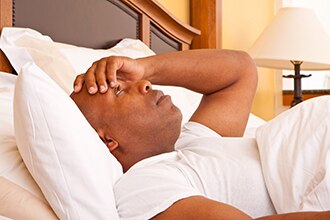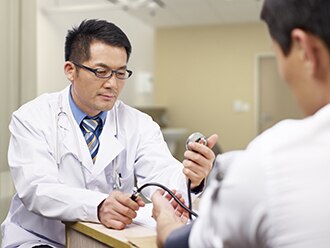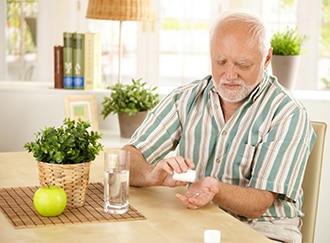Erectile Dysfunction (ED)
Return to Overview PageDefinition & Facts
In this section:
What is ED?
Erectile dysfunction (ED) is a condition that prevents you from getting or keeping an erection that is firm enough for sex. You may be uncomfortable talking about ED. However, a healthy sex life is part of healthy living, and ED can often be treated.
Does ED have another name?
ED is sometimes called impotence, but this term is not used as much now.
How common is ED?
 ED is more common as people get older.
ED is more common as people get older.
ED is common. Research suggests that between 30 million and 50 million men in the United States have ED.1
ED is more common as people get older. At age 40, about 40% of men are affected, while 70% report having ED by age 70.1
Who is more likely to have ED?
You are more likely to have ED as you get older. However, ED is not a routine part of aging. Other factors that make you more likely to have ED include
- certain diseases or conditions, such as diabetes, heart disease, and obesity
- medicines you take, such as blood pressure medicines and antidepressants
- mental health or emotional issues, such as anxiety and stress
- lifestyle behaviors, such as smoking cigarettes or drinking too much alcohol
Your health care professional can help find the cause of your ED and talk with you about treatments.
What are the complications of ED?
Complications of ED may include
- an unfulfilled sex life
- a loss of intimacy between you and your partner
- mental health or emotional issues, such as depression, anxiety, and low self-esteem
- being unable to get a partner pregnant
Reference
Symptoms & Causes
What are the symptoms of erectile dysfunction?
 ED may be a symptom of another health problem.
ED may be a symptom of another health problem.
Symptoms of erectile dysfunction (ED) include
- getting an erection sometimes, but not every time you want to have sex
- getting an erection, but it doesn't last long enough for sex
- being unable to get an erection at any time
ED may be a symptom of another health problem.
What causes ED?
ED can have different causes. Some diseases or health conditions that affect your blood vessels, nerves, or hormones can lead to ED. Also, certain medicines, mental or emotional issues, and lifestyle behaviors may lead to ED.
Diseases and conditions
The most common diseases and conditions that can lead to ED include
- diabetes
- chronic health conditions, such as chronic kidney disease, obesity and overweight, and chronic obstructive pulmonary disease
- heart and blood vessel diseases, such as atherosclerosis, high blood pressure, and stroke
- hormone issues, such as low testosterone and thyroid imbalance
- nerve damage or disorders, such as multiple sclerosis, spinal cord injuries, and damage from pelvic surgery
- problems of the male reproductive system, such as enlarged prostate and penile curvature, also called Peyronie’s disease
Medicines
ED can be a side effect of many common prescription and over-the-counter medicines, such as
- antidepressants
- appetite suppressants, or medicines that make you less hungry
- antihistamines, or medicines for allergies or heartburn
- blood pressure medicines and diuretics, or water pills
- chemotherapy and hormone medicines
- some pain relievers, such as nonsteroidal anti-inflammatory drugs, codeine, and oxycodone
- sedatives, or medicines that make you calm or sleepy
- ulcer medicines
Mental health or emotional issues
Some mental health or emotional issues can either cause ED or make it worse, including
- anxiety, depression, or stress
- feeling isolated or lonely
- low self-esteem, lack of confidence, or negative body image
Lifestyle behaviors
Certain lifestyle behaviors may contribute to ED, including
- not getting enough physical activity
- drinking too much alcohol
- smoking cigarettes
- using recreational and illicit drugs
Diagnosis
How do health care professionals diagnose ED?
Health care professionals, including urologists, use your medical, sexual, and mental health history; a physical exam; and lab and other tests to diagnose erectile dysfunction (ED).
Medical, sexual, and mental health history
 A health care professional will take a medical, sexual, and mental health history to diagnose your ED.
A health care professional will take a medical, sexual, and mental health history to diagnose your ED.
Health care professionals will take your medical history. They may ask what prescribed and over-the-counter medicines, vitamins, and supplements you take.
Your health care professional will review your sexual activity, including asking questions about
- climax
- ejaculation
- erection
- sexual desire
Health care professionals also ask questions about your mental health or emotions you are feeling. They may ask your intimate partner questions about your relationship and how it affects your ED.
This information will help your health care professional understand and diagnose your ED.
Physical exam
Health care professionals perform a physical exam to help diagnose ED. During the exam, they often check for
- blood vessel and nervous system issues
- hormonal problems
- injury to or physical problems with the penis, such as Peyronie’s disease
What tests do health care professionals use to diagnose ED?
Health care professionals may use lab, imaging, and other tests to help diagnose ED.
Lab and imaging tests
To help find the cause of ED, your health care professional may use
- blood tests, including thyroid tests and prostate tests
- ultrasound imaging to show how blood flows through the penis
Other tests
Nocturnal erection test
A nocturnal, or nighttime, erection test checks for erections you have at night. The test can help health care professionals know if your ED is due to a physical problem. You might have this test at home or in a sleep lab.
Injection test
An injection test, also called intracavernosal injection, checks if the penis can get an erection. A health care professional injects a medicine into your penis to see how full the penis gets and how long an erection lasts. The test is usually done in a health care professional’s office.
Treatment
How do health care professionals treat ED?
Health care professionals treat the underlying cause of erectile dysfunction (ED) when possible. Sometimes, the exact cause of ED is not known. Health care professionals will then focus on improving sexual function. Choosing an ED treatment is a personal decision. If you have a partner, you may want to talk together about treatments that work for you as a couple.
Lifestyle changes
Your health care professional may suggest lifestyle changes to help improve your ED symptoms, including
- quitting smoking
- limiting or stopping alcohol use
- increasing physical activity
- maintaining a healthy body weight
- following a healthy eating plan
- stopping recreational and illicit drug use
Counseling
 A counselor may suggest that you bring your partner to counseling sessions.
A counselor may suggest that you bring your partner to counseling sessions.
Health care professionals may suggest counseling if mental health or emotional issues are affecting your ED. Counselors can help you lower anxiety and stress about sex. Your counselor may ask you to bring your partner to sessions for more support.
Medicines
Your health care professional may review any medicines you are taking to see if a medicine you need for another health condition is causing ED. They may suggest taking a different dose of medicine or switching to another medicine. Do not stop taking any medicines on your own. Talk with your health care professional first.
Health care professionals may also prescribe other types of medicines for your ED.
Phosphodiesterase type 5 inhibitors
Phosphodiesterase type 5 (PDE5) inhibitors are oral medicines that improve blood flow to the penis. These medicines may help you get and keep an erection.
Testosterone
 A health care professional may prescribe oral medicines for your ED.
A health care professional may prescribe oral medicines for your ED.
If you have ED and low testosterone, health care professionals may prescribe testosterone with PDE5 inhibitors. You may be given testosterone as an oral medicine, a patch, or a gel.
Injectable medicines and suppositories
Injectable medicines and suppositories can enhance erections. An injectable medicine causes a quick, automatic erection by increasing blood flow to the penis. Some people with ED prefer a suppository, a solid piece of medicine that you insert into the urethra.
Your health care professional will teach you how to give yourself an injection or insert a suppository.
Alternative medicines
Some people say certain alternative medicines help their ED symptoms. For safety reasons, talk with your health care professional before using dietary supplements, such as vitamin or mineral supplements, or any complementary or alternative medicines or medical practices.
Vacuum erectile device
Vacuum erectile devices (VEDs) pull blood into the penis for an erection. VEDs have three parts, including
- a plastic tube to put around your penis
- a pump that creates a vacuum
- an elastic ring that helps you to keep an erection
You may need to practice with or adjust your VED. Sometimes, VEDs can make your penis feel cold or numb. Your penis could look purple or bruised. Bruises are usually painless and will disappear in a few days. VEDs may weaken ejaculation but this doesn’t affect the pleasure of climax or orgasm.
Surgery
Most people with ED do not need surgery. If you have tried all other options and your ED does not improve, you and your health care professional may consider surgery to
- implant a device—called a prosthesis—to make the penis erect, either using a pump in the scrotum or a rod that you can control on your own
- repair arteries to increase blood flow to the penis, a procedure that works best for younger men
Your health care professional will describe the benefits and possible side effects of surgery.
Seek care right away
ED medicines that you take by mouth, through an injection, or as a suppository can have side effects, including
- erections that last longer than 4 hours, known as priapism
- vision or hearing loss after taking oral ED medicines
Call your health care professional right away if you develop these problems.
How can I prevent ED?
Lifestyle factors can often lead to ED or make its symptoms worse. Sometimes, changing a daily habit could help prevent or improve your ED.
Quit smoking
If you smoke cigarettes, one of the best things you can do for your ED and your overall health is to quit smoking. Smoking cigarettes is linked to heart and blood vessel disease, which can lead to ED.
Follow a healthy eating plan
Eating well helps to maintain erectile function. Consider working with a registered dietitian, if possible, to create an eating plan for your individual needs. You can find a registered dietitian online through the Academy of Nutrition and Dietetics or through your health care professional. A dietitian can create a custom meal plan for you.
Maintain a healthy weight
A healthy weight can improve testosterone levels and self-esteem, which may help prevent ED. Maintaining a healthy weight can also prevent diabetes and high blood pressure, which can cause ED.
Be physically active
Physical activity increases blood flow through your body, including the penis, and can help keep you at a healthy weight. The Physical Activity Guidelines for Americans, 2nd edition, recommends at least 150 minutes, or 2 hours and 30 minutes, of moderate-intensity physical activity, such as brisk walking, each week.2
Reduce stress
Taking care of your mental and emotional health can help prevent ED. If you feel stressed, try relaxation techniques and other activities that might soothe you. A simple way to relax is deep breathing, which you can do anywhere.
Avoid drugs and limit alcohol
You can help prevent ED by avoiding recreational and illicit drugs and limiting how much alcohol you drink. Some drugs can prevent arousal or other sensations that are important for getting and keeping an erection. Sometimes, illicit drugs and too much alcohol may mask other mental health, emotional, or physical factors that cause ED.
Reference
Eating, Diet, & Nutrition
What should I eat if I have ED?
Research shows that a healthy diet can lower the risk of developing erectile dysfunction (ED) and improve ED symptoms.3
Your food choices are important for managing or preventing ED. Studies have shown that certain diets—such as the Mediterranean diet—help decrease the chance of getting ED.4,5 Table A3-5 of the 2020–2025 Dietary Guidelines for Americans (PDF, 32.5 MB) offers more information about the Mediterranean diet for healthy eating.
Healthy food choices include
- vegetables, such as cabbage, leafy greens, and beets
- fruits, such as apples, berries, kiwifruit, and oranges
- legumes, such as lentils, beans, and peas
- unsaturated fats from nuts, seeds, and fatty fish
- whole-grain foods, such as oats, brown rice, and quinoa
Your health care professional may suggest you work with a registered dietitian, if possible, to create an eating plan for your individual needs. You can find a registered dietitian online through the Academy of Nutrition and Dietetics or through your health care professional. A dietitian can create a custom meal plan for you.
 A healthy diet can lower the risk of developing ED or improve ED symptoms.
A healthy diet can lower the risk of developing ED or improve ED symptoms.
What foods and drinks should I avoid if I have ED?
Foods and drinks that increase the risk of diabetes, heart disease, and obesity can also increase the chance of having ED.
Try to avoid or limit
- foods high in saturated fats, such as red meat and fried foods
- full-fat dairy foods, including whole milk, cream, butter, and cheese
- refined carbohydrates, such as pastries, chips, white rice, and candy
- foods and drinks high in sodium and added sugars
- packaged foods, such as lunch meats and snack bars
- drinks that contain alcohol
References
Clinical Trials
NIDDK conducts and supports clinical trials in many diseases and conditions, including urologic diseases. The trials look to find new ways to prevent, detect, or treat disease and improve quality of life.
What are clinical trials for erectile dysfunction?
Clinical trials—and other types of clinical studies—are part of medical research and involve people like you. When you volunteer to take part in a clinical study, you help doctors and researchers learn more about disease and improve health care for people in the future.
Researchers are studying many aspects of erectile dysfunction (ED), such as
- new treatments for ED
- how diet affects ED
- how to prevent ED after prostate surgery
Find out if clinical studies are right for you.
Watch a video of NIDDK Director Dr. Griffin P. Rodgers explaining the importance of participating in clinical trials.
What clinical studies for erectile dysfunction are looking for participants?
You can view a filtered list of clinical studies on erectile dysfunction that are federally funded, open, and recruiting at ClinicalTrials.gov. You can expand or narrow the list to include clinical studies from industry, universities, and individuals; however, the National Institutes of Health does not review these studies and cannot ensure they are safe for you. Always talk with your health care provider before you participate in a clinical study.
This content is provided as a service of the National Institute of Diabetes and Digestive and Kidney Diseases
(NIDDK), part of the National Institutes of Health. NIDDK translates and disseminates research findings to increase knowledge and understanding about health and disease among patients, health professionals, and the public. Content produced by NIDDK is carefully reviewed by NIDDK scientists and other experts.
NIDDK would like to thank:
Arthur L. Burnett, M.D., The Johns Hopkins University School of Medicine

